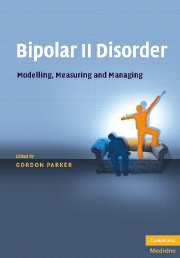Book contents
- Frontmatter
- Contents
- List of contributors
- Preface
- Introduction
- 1 Bipolar disorder in historical perspective
- 2 The bipolar spectrum
- 3 Defining and measuring Bipolar II Disorder
- 4 Bipolar II Disorder in context: epidemiology, disability and economic burden
- 5 Is Bipolar II Disorder increasing in prevalence?
- 6 The neurobiology of Bipolar II Disorder
- 7 The role of antidepressants in managing Bipolar II Disorder
- 8 The use of SSRIs as mood stabilisers for Bipolar II Disorder
- 9 Mood stabilisers in the treatment of Bipolar II Disorder
- 10 The use of atypical antipsychotic drugs in Bipolar II Disorder
- 11 The role of fish oil in managing Bipolar II Disorder
- 12 The role of psychological interventions in managing Bipolar II Disorder
- 13 The role of wellbeing plans in managing Bipolar II Disorder
- 14 Survival strategies for managing and prospering with Bipolar II Disorder
- 15 A clinical model for managing Bipolar II Disorder
- 16 Management commentary
- 17 Management commentary
- 18 Management commentary
- 19 Management commentary
- 20 Management commentary
- 21 Management commentary
- 22 Management commentary
- 23 Management commentary
- 24 Management commentary
- 25 Management commentary
- 26 Management commentary: What would Hippocrates do?
- 27 Management commentary
- 28 Rounding up and tying down
- Appendix 1 Black Dog Institute Self-test for Bipolar Disorder: The Mood Swings Questionnaire
- Index
- References
13 - The role of wellbeing plans in managing Bipolar II Disorder
Published online by Cambridge University Press: 13 August 2009
- Frontmatter
- Contents
- List of contributors
- Preface
- Introduction
- 1 Bipolar disorder in historical perspective
- 2 The bipolar spectrum
- 3 Defining and measuring Bipolar II Disorder
- 4 Bipolar II Disorder in context: epidemiology, disability and economic burden
- 5 Is Bipolar II Disorder increasing in prevalence?
- 6 The neurobiology of Bipolar II Disorder
- 7 The role of antidepressants in managing Bipolar II Disorder
- 8 The use of SSRIs as mood stabilisers for Bipolar II Disorder
- 9 Mood stabilisers in the treatment of Bipolar II Disorder
- 10 The use of atypical antipsychotic drugs in Bipolar II Disorder
- 11 The role of fish oil in managing Bipolar II Disorder
- 12 The role of psychological interventions in managing Bipolar II Disorder
- 13 The role of wellbeing plans in managing Bipolar II Disorder
- 14 Survival strategies for managing and prospering with Bipolar II Disorder
- 15 A clinical model for managing Bipolar II Disorder
- 16 Management commentary
- 17 Management commentary
- 18 Management commentary
- 19 Management commentary
- 20 Management commentary
- 21 Management commentary
- 22 Management commentary
- 23 Management commentary
- 24 Management commentary
- 25 Management commentary
- 26 Management commentary: What would Hippocrates do?
- 27 Management commentary
- 28 Rounding up and tying down
- Appendix 1 Black Dog Institute Self-test for Bipolar Disorder: The Mood Swings Questionnaire
- Index
- References
Summary
Introduction
In recent years, the treatment of bipolar disorder has increasingly recognised the central importance of helping people to identify their early warning signs and episode triggers, and to develop strategies aimed at preventing or minimising future episodes. The axiom ‘knowledge is power’ holds true for those with bipolar disorder who wish to manage their illness well. The ‘knowledge’ part of the axiom refers to the need to develop a fine-tuned awareness of one's own early warning signs and triggers, as well as becoming well informed about the medical, physical and psychological aspects of the illness in general. Gathering a large body of information about one's ‘enemy’ in this way is how one gains ‘power’ over this illness – the power to recognise a potential risk, and to know how to act swiftly to neutralise it.
In recent research (Russell and Browne, 2005), in which 100 people with bipolar disorder were interviewed about how they had remained well for long stretches, all participants indicated they had developed some kind of plan or strategy to remain well. Many had remained well for more than 10 or even 20 years. The plans these people developed to stay well were highly personalised and surprisingly diverse in the needs addressed and the solutions adopted. The most used strategies included a commitment to getting adequate sleep, being aware of warning signs and triggers, keeping stress to a manageable level, taking appropriate medication, and making use of compassionate social and professional supports.
- Type
- Chapter
- Information
- Bipolar II DisorderModelling, Measuring and Managing, pp. 177 - 194Publisher: Cambridge University PressPrint publication year: 2008
References
- 3
- Cited by

